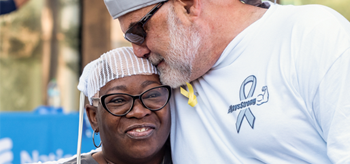On June 22, 2022, the U.S. Food and Drug Administration (FDA) granted accelerated approval to a new treatment combination that will now be available as an option for certain brain tumor patients.
The FDA approved the combination of two oral drugs called dabrafenib (brand name: Tafinlar) and trametinib (brand name: Mekinist) for the treatment of advanced tumors that have a mutation called “BRAF V600E.” The approval includes use in both adult and pediatric (older than 6 years of age) high- and low-grade glioma patients with this mutation whose tumors progressed after prior treatment.
The approval is based on the results from a number of clinical trials, which included adult and pediatric high-grade and low-grade glioma patients. Data pooled from across these trials showed that the Tafinlar-Mekinist combination successfully shrank a significant percentage of these patients’ tumors. Using a measure called “Overall Response Rate (ORR),” trials found that 33% of high-grade glioma patients responded to the combination, while 50% of low-grade glioma patients saw tumor shrinkage benefits. For the pediatric glioma patients, 25% responded to the treatment.
The BRAF V600E mutation is estimated to be prevalent in 5-15% of all low-grade gliomas (15-20% of pediatric low-grade gliomas), including 60-80% of pleomorphic xanthoastrocytomas (PXA), 20-70% of gangliogliomas, and 10% of pilocytic astrocytomas. The mutation has been identified less frequently in high-grade gliomas, including approximately 3% of glioblastomas.
“This approval will offer a much-needed new treatment option for hundreds of glioma patients with a BRAF V600E mutation,” said David Arons, chief executive officer, National Brain Tumor Society. “This is very positive news for the brain tumor community and offers hope that current research and drug development efforts are beginning to yield meaningful breakthroughs for patients that currently have too few options. We thank Novartis for including both adult and pediatric glioma patients in these trials, as well as the researchers and clinicians involved, and most importantly the patients and their families that participated in the studies.”
The most common side effects seen in adult patients were fever, fatigue, nausea, rash, chills, headache, hemorrhage, cough, vomiting, constipation, diarrhea, muscle and joint pain, and edema.
The most common side effects seen in pediatric patients included fever, rash, vomiting, fatigue, dry skin, cough, diarrhea, dermatitis acneiform, headache, abdominal pain, nausea, hemorrhage, and constipation.
Because the approval for this treatment was granted through the FDA’s accelerated approval pathway, the sponsor of the clinical trial, Novartis, will be required to complete confirmatory trials to verify the effectiveness of these drugs to date. According to reports, the company may already have additional evidence of effectiveness in pediatric low-grade glioma patients, including in children as young as one. Based on data presented recently at the 2022 American Society of Clinical Oncology (ASCO) annual meeting, the Tafinlar-Mekinist combination resulted in 47% ORR versus chemotherapy (11%) and reduced the risk of progression or death by 69%. Additionally, in a separate, small subset of this trial, pediatric high-grade glioma patients treated with Tafinlar-Mekinist showed an ORR of 56.1% and generally consistent safety results.
Further buoying these results were data also presented at ASCO 2022 from Day One Bio of their own BRAF-targeting drug, tovorafenib (DAY101), which also showed effectiveness in relapsed pediatric low-grade glioma. We await additional future results from trials of tovorafenib (DAY101).
“Given this latest approval, and the recent data from ASCO, NBTS strongly urges that neuro-surgical and oncology providers treating glioma patients secure for patients a test that can identify their BRAF V600E status as part of robust molecular biomarker testing informed by the 2021 World Health Organization’s reclassification of CNS tumors as a routine step that could determine which patients could benefit from these drugs,” added Arons.
NBTS offers a Personalized Support and Navigation service staffed by a team with deep experience navigating brain tumor treatment options and questions. Patients and families who have questions about this or other options can contact the NBTS team at patientnavigator@braintumor.org.



